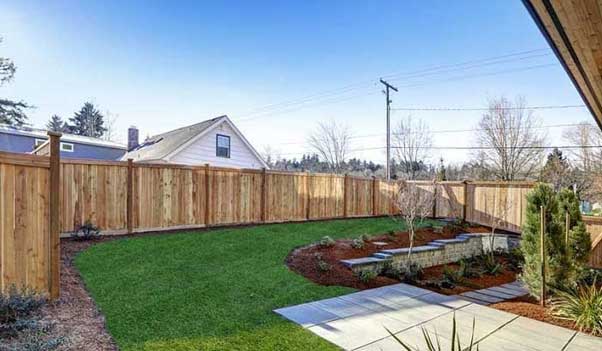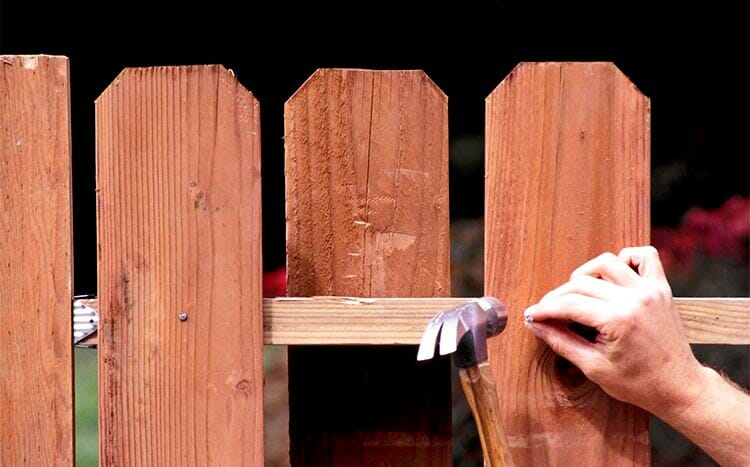In sunny California, numerous people often find themselves puzzled by the complex network of fencing regulations. However, here’s the thing: understanding these regulations thoroughly is akin to possessing a golden ticket when disputes with neighbors come calling.
Among the most important laws you should keep in mind is the California Good Neighbors Fence Laws act.
Here’s a guide to help you answer any of the tough questions that may pop up when fencing.
What we cover
ToggleCan my neighbor build a fence on the property line?
Yes, if you both consent to that decision. California’s Good Neighbors Fence law requires that the neighbor gives you a 30-day notice before taking action, a period in which he/she should ask for your financial input.
This notice should cover the tentative fencing timeline, the proposed model of sharing costs, and a summary of the overall cost factors.
If the neighbor builds the fence without consulting you for any reason, that can be considered to be a spite fence under law. You can take legal action for this case and win it quite comfortably.

Who pays for a fence between neighbors in California?
Every neighbor benefits from it. The Fencing Statutes in CA under section 841 presumes that both you and your neighbor benefit from the fence and are thus mutually responsible for it. It states that unless you have a prior agreement, both neighbors who use the fence are liable to pay for any constructions, maintenance, repairs, and replacements.
If your neighbor refuses to pay for any reason, here’s a good way to deal with them:
- First, write them a letter indicating the problems with the fence and the kinds of repair needed.
- Next, have an expert complete all the required damages, then demand your payment for 50% of the total you spend on the fencing.
- Try mediation or an out-of-court agreement with the neighbor
- Lastly, sue the neighbor if mediation didn’t work to ensure that they reimburse you.
How close to the property line can I build a fence?
Between 2 to 8 inches. When building a fence in your yard, you’ll need to be more cautious when approaching the property boundaries. In California, two inches from the property line is enough when building the fence.
Your best bet will be erecting the fence well within your property’s boundaries. However, in cases where your neighbor doesn’t care, you can get away with building a fence on the property line.
Do I have to tell my neighbor I’m putting up a fence in CA?
Yes, you do. Unless you’re putting up a fence within your boundaries, if you plan to erect a fence that will benefit both you and your neighbor, you’ll have to tell them.
In fact, you should notify them about 30-days prior. The fence laws in California state that ‘the landowner shall give 30 days prior written notice to each affected adjoining landowner.’
Telling your neighbor ensures that you sort out the presumptive details of equal responsibility in the cost and maintenance of the new fence.
How do I find out who owns a boundary fence?
In most cases, a boundary fence is considered yours if you built it. However, for homeowners who’ve lived in fenced houses dating back to the 1970s, it might be quite hard to tell which neighbor owns the boundary fence.
So, to find out these details, check the copies of your title deed or visit the Land registry offices near you. The data you get will show if, at some point, the owners decided to share the costs for the fence.
What is a spite fence?
A spite fence refers to an overly tall and ugly fence or fence-like structure constructed with the intention of annoying your neighbor. The Good Neighbors Fence laws refer this to be a fencing structure taller than 10 feet and have no purpose for the landowner.
The fence could be made from bushes, wood, or even cinder blocks. If your neighbor does such a thing, the fence laws allow you to sue him for private nuisance.
Spite fences that violate the set local regulations or homeowner’s association restrictions will also be regulated to ensure they don’t affect the image of the surrounding area.

How high can I build a privacy fence?
This will depend on the location of the fence. The state of California regulations limits the height of a fence to around 4 feet on the front yard and up to 6 feet on the backyard.
If you need a taller fence, you’ll have to seek a permit at the local building code office. The only exception to this law is if the fence was built long before the maximum height law passed.
The rules will also vary depending on the purpose of the fence, e.g., a garden fence or privacy swimming pool fence.
California boundary fence laws at a glance
This table provides an overview of some of the state laws governing the fence laws in California and links to their original documents.
| Statues | Boundary fence | Max heights | Spite fence |
|---|---|---|---|
| Fence construction: 841 Property line laws: 829 - 835Spite fence law: 841.4 | Adjoining landowners are presumed to share an equal benefit from any fence dividing their properties unless otherwise agreed to by the parties in a written agreement. Where a landowner intends to incur costs for a fence, the landowner shall give 30 days prior written notice to each affected adjoining landowner. Adjoining landowners shall share equally in the responsibility for maintaining the boundaries and monuments between them. | Fences on your front yard shouldn't be taller than 4 feet and not taller than 6 feet in the backyard. | Any fence or other structure in the nature of a fence unnecessarily exceeding 10 feet in height maliciously erected or maintained to annoy the owner or occupant of adjoining property is a private nuisance. |
FAQ's
Who owns the fence between neighbors?
According to California’s Good Neighbor Fence law, any two people who share a border or fence are presumed to be co-owners of the fence. As such, they are responsible for the repair and maintenance of the fence. Each neighbor has to contribute 50% of the total costs to be incurred.
The only exception to this law is if the fence only benefits one party, i.e., If a neighbor doesn’t care about fencing his property.
What happens if a neighbor refuses to pay for a fence between neighbors?
Take them to a small claims court! If your neighbor benefits from the fence but doesn’t want to pay their half for the maintenance or repairs, suing them will definitely work the magic.
However, be sure to always try negotiation with the neighbor first before opting to involve lawyers.
Can a neighbor remove a fence?
It depends. If the fence is on their property then by law, they can do almost anything they want.
However, if it’s a shared fence or you’re the sole owner, and you’re not happy with the decision, you can talk to the neighbor about reinstating the fence or even sue them for violating the Good Neighbors Fence law.
Your neighbor will only remove your fence through a court injunction that goes against you.
Can I erect a fence on my side of the boundary?
Of course! If you’re working within the boundaries of your property, you can erect a fence and do whatever you want. Your only limitation will be on the maximum height allowed by state law. In California, it stands at 10 feet.
Can I legally paint my side of Neighbors fence?
No! Before doing anything on your neighbor’s side of the fence, the law will demand you first consult with the neighbor. Even if you’re looking to complete a small task like painting the neighbor’s fence, ensure they’re aware and have contributed to the job.
What can you do if your neighbor encroaches on your property?
Encroachment to your property is a serious issue, especially for a homeowner looking to sell the home. If your neighbor has built his fences on your land, you’ll have multiple options on how to go about it.
Simply talking to the neighbor about the issue might sometimes be the only thing required to resolve the issue. You can also try selling the encroached zones to the neighbor if they feel too attached to them.
And when all things fail, sue the neighbor and take them to court. They’ll be charged with trespassing and no encroachment, and most likely, you’ll get your land back.
Can Neighbours attach things to my fence?
No! Your fence belongs solely to you. Therefore, your neighbor can’t hang their stuff on your side of the fence without your permission. If they’ve already done it, try and resolve the issue by first talking to them before pursuing legal action.












